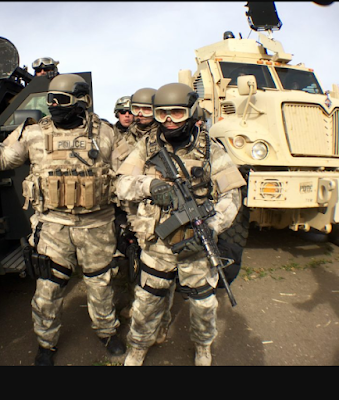By Brenda Norrell
Censored News
A new report reveals how successful Indigenous protests resulted in the fossil fuel industry bankrolling new laws to slap peaceful protesters with unjust prison time, fines and lawsuits.
"Indigenous-led protest is among the most successful drivers of ambitious climate action that exist," states the new report, "Critical Infrastructure Laws: A Threat to Protests and the Planet," by Climate Cabinet.
 |
| Image Censored News https://bsnorrell.blogspot.com/2017/05/intercept-exposes-tigerswan-mercenaries.html |
The report begins with a potent recounting of the attack with dogs on Standing Rock Water Protectors in North Dakota, who were defending the Missouri River from the Dakota Access Pipeline.
"On a chilly fall day, police and private security released attack dogs and water cannons on a group of protesters. The year was 2016, not 1963."
 |
| Happy American Horse, Lakota, locked down to halt construction of Dakota Access Pipeline at Standing Rock in August of 2016. |
The resistance at Standing Rock galvanized people around the world, with support arriving from every region on the planet. Palestinians, Sami, and Islanders arrived from every region of the world.
Greedy corporations, bolstered by the United States government, reacted with fear, bankrolling the lobbyists who worked with state legislators to criminalize protests.
 |
| Militarized police at Standing Rock 2016 |
After the resistance in Standing Rock was shut down -- by militarized police firing tear gas, rubber bullets, and projectiles resulting in critical injuries, and heavily armed police swarmed the Water Protector camps in February of 2017 -- three state legislatures introduced bills to silence future protests at pipelines and other oil and gas facilities.
The bills failed in two states, Georgia and Colorado, but passed in a third state: Oklahoma.
Oil, Gas, and Blood Drenched Oklahoma Leads Attack on Peaceful Pipeline Protesters
Oklahoma Representative Scott Biggs made sure the anti-protest bill prevented people from protesting pipelines in Oklahoma.
Rep. Biggs made it clear that he didn't want another Standing Rock in Oklahoma. However, he neglects to mention who caused the violence at Standing Rock.
TigerSwan's Role Concealed
"Documents obtained by The Intercept show that TigerSwan, a private security firm that worked on DAPL, Dakota Access Pipeline, treated peaceful demonstrators like terrorist agents," the report says.
"The firm sought to discourage, divide, and 'delegitimize the anti-DAPL movement' using a social media disinformation campaign – not to mention attack dogs, water cannons, and rubber bullets."
The Oklahoma-ALEC model provides two strategies to deter people from demonstrating near fossil fuel assets: Oversized penalties for individuals and fines and lawsuits for organizations.
Oklahoma's Pipeline Protest Bill: A Felony, $100,000 Fine, and 10 Years Prison
Leaky Pipes and the Threat to Clean Water
Enbridge Spill in Michigan
When Standing Rock resistance was underway, Water Protectors made it clear that all pipelines leak.
After the resistance at Standing Rock, Water Protectors continued their resistance in Minnesota, battling Enbridge's Line 3.
Enbridge has a history of the type of criminalized negligence that is ignored by legislators and the United States government.
"Energy company Enbridge built the Line 6B pipeline across southern Michigan in 1969, but few residents noticed it until 2010."
"That year on July 25, Line 6B ruptured, and an estimated 1.18 million gallons of crude oil poured into the Kalamazoo River," the new report states.
Tarsands Threatened Ogallala Aquifer
Canada's tarsands leakage includes the cancer-causing benzene.
"Keystone XL would have carried tar sands oil – the same heavy, corrosive oil that spilled out of Line 6B. A leak on its 1,209-mile journey from Alberta, Canada to Steele City, Nebraska could have contaminated Nebraska’s Ogallala aquifer, which provides 30 percent of America’s irrigation water," the report states.
How to Criminalize Protests
After Standing Rock, ALEC used the protection of critical infrastructure to silence and threaten protesters with prison time.
Within a year, a group of conservative legislators known as the American Legislative Exchange Council (ALEC) had turned Oklahoma’s twin anti-protest bills (HB 1123 and HB 2128) into a unified model bill for other states to copy.
Lobbyists swayed legislators and called it the Critical Infrastructure Protection Act.
Since 2017, similar pipeline protest bills have been introduced in a total of 24 states.
The Dirty Seventeen
Seventeen states have passed these bills into law: Alabama, Arkansas, Indiana, Kansas, Kentucky, Louisiana, Mississippi, Missouri, Montana, North Dakota, Ohio, Oklahoma, South Dakota, Tennessee, Texas, West Virginia, and Wisconsin.
On the Frontline: Indigenous Resistance Battled 26 Projects
Pointing out the benefit to humanity, the new report says, "Indigenous activists have put their bodies on the line to protect their rights to clean water and self-determination. These protests are making an impact – on specific projects like Keystone XL and DAPL, and the struggle for climate action overall."
Read the full report:
BY JONATHON BORJA WITH EMMA FISHER, CLIMATE CABINET EDUCATION REPORT FOR STANFORD UNIVERSITY EARTH SYSTEMS PROGRAM A THREAT TO PROTEST & THE PLANET CRITICAL INFRASTRUCTURE LAWS SEPTEMBER 2022
https://climatecabineteducation.org/wp-content/uploads/2022/09/Critical-Infrastructure-Report.pdf





No comments:
Post a Comment